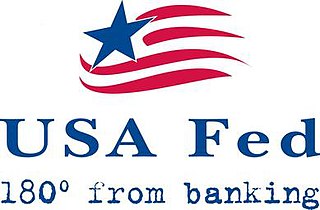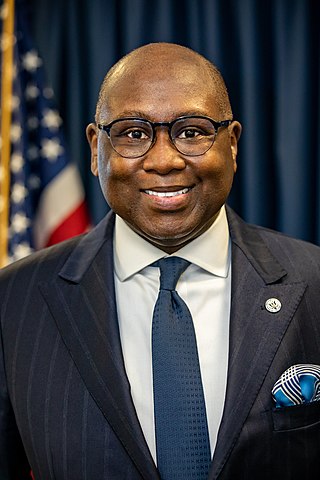
Financial regulation is a form of regulation or supervision, which subjects financial institutions to certain requirements, restrictions and guidelines, aiming to maintain the stability and integrity of the financial system. This may be handled by either a government or non-government organization. Financial regulation has also influenced the structure of banking sectors by increasing the variety of financial products available. Financial regulation forms one of three legal categories which constitutes the content of financial law, the other two being market practices and case law.

A credit union is a member-owned nonprofit cooperative financial institution.

The National Credit Union Administration (NCUA) is a government-backed insurer of credit unions in the United States, one of two agencies that provide deposit insurance to depositors in U.S. depository institutions, the other being the Federal Deposit Insurance Corporation, which insures commercial banks and savings institutions. The NCUA is an independent federal agency created by the United States Congress to regulate, charter, and supervise federal credit unions. With the backing of the full faith and credit of the U.S. government, the NCUA operates and manages the National Credit Union Share Insurance Fund, insuring the deposits of more than 124 million account holders in all federal credit unions and the overwhelming majority of state-chartered credit unions. Besides the Share Insurance Fund, the NCUA operates three other funds: the NCUA Operating Fund, the Central Liquidity Facility (CLF), and the Community Development Revolving Loan Fund (CDRLF). The NCUA Operating Fund, with the Share Insurance Fund, finances the agency's operations.

The Credit Union National Association, commonly known as CUNA, is a national trade association for both state- and federally chartered credit unions located in the United States. CUNA provides member credit unions with trade association services, such as lobbying, regulatory advocacy, professional development, and professional services management. The organization operates out of its headquarters in Washington, D.C., and an operations center in Madison, Wisconsin. CUNA's president and chief executive officer Jim Nussle has led the organization since September 2014.
A corporate credit union, also known as a central credit union, provides services to natural person (consumer) credit unions. In the credit union industry, they are sometimes referred to as "the credit union’s credit union". In the United States, corporate credit unions may either be chartered by the National Credit Union Administration (NCUA), or under state authority if permitted under that state's financial services laws.

Security Service Federal Credit Union (SSFCU) is a credit union headquartered in San Antonio, Texas, federally chartered and federally insured by the National Credit Union Administration (NCUA). With more than $10.5 billion in assets, Security Service serves more than 800,000 members, and operates 66 locations throughout Texas, Colorado and Utah. Security Service is the largest credit union in San Antonio, Texas, and is among the largest credit unions in the United States. The credit union provides access to more than 5,000 credit union locations nationwide through the CU Service Centers shared branching network.
The New York State Banking Department was created by the New York Legislature on April 15, 1851, with a chief officer to be known as the Superintendent. The New York State Banking Department was the oldest bank regulatory agency in the United States.
The NCUA Corporate Stabilization Program was created on January 28, 2009, in response to investment losses incurred at U.S. Central Credit Union. U.S. Central was a third-level corporate credit union that provided services to other corporate credit unions, which in turn served public-facing credit unions.

Credit unions in the United States served 100 million members, comprising 43.7% of the economically active population, in 2014. U.S. credit unions are not-for-profit, cooperative, tax-exempt organizations. The clients of the credit unions become partners of the financial institution and their presence focuses in certain neighborhoods because they center their services in one specific community. As of March 2020, the largest American credit union was Navy Federal Credit Union, serving U.S. Department of Defense employees, contractors, and families of servicepeople, with over $125 billion in assets and over 9.1 million members. Total credit union assets in the U.S. reached $1 trillion as of March 2012. Approximately 236,000 people were directly employed by credit unions per data derived from the 2012 National Credit Union Administration (NCUA) Credit Union Directory. As of 2019, there were 5,236 federally insured credit unions with 120.4 million members, and deposits of $1.22 trillion.
National Credit Union Administration v. First National Bank & Trust Co., 522 U.S. 479 (1998), is a 1998 legal case in which the Supreme Court of the United States ruled that banks had prudential standing to challenge regulations that permitted credit unions to enroll unaffiliated members.

United Services of America Federal Credit Union was a credit union headquartered in San Diego, California, chartered and regulated under the authority of the National Credit Union Administration (NCUA) of the U.S. federal government.

VyStar Credit Union is a member-owned financial cooperative that is headquartered in Jacksonville, Florida. It offers a comprehensive selection of products, including deposit and loan services for consumers and businesses, as well as investments, insurance, retirement planning and financial counseling. Founded in 1952 as Jax Navy Federal Credit Union, VyStar is the largest mortgage lender and the fourth-largest financial institution in Northeast Florida. It is regulated by the Florida Office of Financial Regulation and federally insured by the National Credit Union Share Insurance (NCUSIF) offered by the National Credit Union Administration (NCUA).
Western Bridge Corporate Federal Credit Union, or WesCorp, was a financial services cooperative headquartered in San Dimas, California. As a corporate credit union, WesCorp provided services to natural person (consumer) credit unions. WesCorp served America's credit union industry as an aggregator of financial products and services for the purpose of delivering cost-savings and greater efficiencies to more than 950 member/owner credit unions throughout the United States.

Randolph-Brooks Federal Credit Union (RBFCU) is a credit union headquartered in Live Oak, Texas, chartered and regulated under the authority of the National Credit Union Administration (NCUA). RBFCU serves more than 850,000 members from a network of full-service branch locations in Texas, and has more than $14.77 billion in assets as of May 2022. It is one of the largest credit unions in the United States; and is the largest credit union in Texas, and the 11th largest credit union in the United States, based on total assets.

Deborah "Debbie" Matz is an American civil servant who served as the 8th Chairman of the National Credit Union Administration.

Michael E. Fryzel is an American attorney with offices in Chicago, Illinois. Following the 2016 general election, Fryzel served on President Donald J. Trump's Transition Team and developed the Agency Action Plan for the National Credit Union Administration.

John Mark McWatters is a lawyer, accountant and former Board Member of the National Credit Union Administration (NCUA). He was appointed by President Donald Trump on June 23, 2017, to serve as the tenth Board Chairman of the NCUA, and resigned from the NCUA Board on November 20, 2020.

The Apple Federal Credit Union is a U.S. credit union founded in 1956 and headquartered in Fairfax, Virginia, chartered and regulated under the authority of the National Credit Union Administration (NCUA). As of February 2020, Apple FCU had more than 220,000 members and over $3 billion USD in assets, making it larger than over 90% of federal credit unions in the United States.

Rodney E. Hood is a member of the National Credit Union Administration board and was the eleventh chairman of the board from 2019 to 2021. Hood was the first African-American to lead a federal banking agency.














